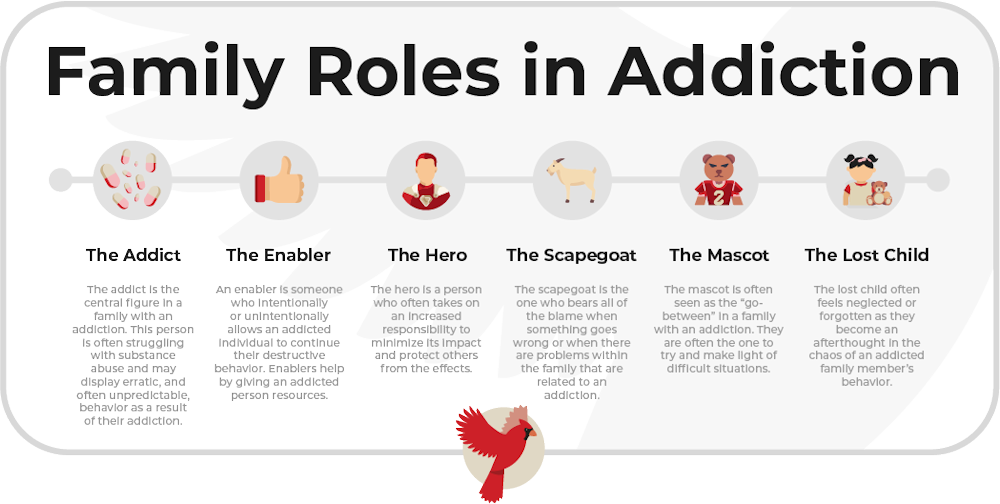Family Roles in Addiction: The Six Types
Addiction is a serious issue that affects many individuals and their families. While it can be an overwhelming experience, understanding the roles family members may play in addiction can help empower and support each other through recovery. Family members play different roles when someone struggles with addiction. Even while in a young adult rehab program, family roles still play a part in recovery.
Some may provide financial or emotional support, while others might take on a more active role such as attending meetings with the individual or helping them access resources. By understanding these roles, families can work together to help their loved one successfully overcome their addiction.
Table of Contents
ToggleHow Family is Impacted by Addiction
Addiction can have a profound and devastating impact on the family unit. Family plays an important role in the life of an addict; from providing emotional and financial support, to helping them cope with their addiction. Unfortunately, when addiction takes hold, strain within the family becomes prevalent, disrupting or distorting communication. When family members learn how to address addiction in the family, they can help support their loved one in their recovery. This could help build better and stronger relationships.
Family members who are affected by addiction can experience feelings of guilt, fear, shame, anxiety, confusion and anger. They may also struggle to understand why their loved one has become addicted and feel helpless in their ability to help. It is important that family members seek professional help if they are struggling with understanding mental health issues like anxiety and addiction and its effects on the family. Counseling, family therapy for addiction and support groups can help families learn how to cope with addiction as well as provide them with resources to address it.
The Six Family Roles in Addiction

When an addiction is present, it often causes serious disruption to the roles family members are expected to fulfill. For instance, when a parent becomes addicted to alcohol or drugs, it can lead to neglect. A parent’s addiction can also create a feeling of abandonment in their kids. If the addict is a spouse, it can lead to marital issues and difficulties with communication and trust. In addition to this, there are typically six familial roles in addiction. These include the following:
- The Addict
- The Enabler (Caretaker)
- The Hero
- The Scapegoat
- The Mascot
- The Lost Child

The Addict
The addict is the central figure in a family with an addiction. This person is often struggling with substance abuse and may display erratic and unpredictable behavior as a result of their addiction. They may be distant or unresponsive to their family members, causing tension and frustration within the home environment.
The addict’s decisions are strongly influenced by their addiction, which can have far-reaching consequences for themselves and their loved ones. Family members of an addict often take on additional roles in order to cope with the addiction in their home. These roles may include the enabler, which hasn’t been included in the list above.
The Enabler (Caretaker)
Addiction is a complex issue that has far-reaching effects; this is true not only for the individual struggling with it, but also for their family members. Each member of the family plays a unique role in helping or hindering recovery efforts. One of the roles is that of the caretaker.
Caretakers are often responsible for providing emotional and practical support to their loved one suffering from addiction. Caretakers may be a spouse, parent or other family member tasked with coordinating treatment plans, managing finances, providing transportation to rehabilitation appointments and maintaining communication between family members and healthcare providers.
Caretaking also involves taking steps to ensure the person struggling with addiction is not engaging in behaviors that could further their substance abuse. This can mean monitoring their activities and helping them avoid certain people or places that may trigger a relapse. Caretakers may also need to manage any difficult emotions that arise during the recovery process, such as frustration, anger or sadness.
What is the Role of The Enabler?
Addiction often affects the entire family, not just the person suffering from it. Family members can play various roles in how they respond to addiction and the addict’s behaviors. One of the important roles is that of an enabler, which can happen both intentionally and unintentionally. An enabler is someone who intentionally or unintentionally allows an addicted individual to continue their destructive behavior.
Enablers help by giving an addicted person resources, covering for them financially or emotionally, or making excuses for their behavior. Enablers can cause significant harm to the addicted person. They can also cause harm to other family members if they do not receive help in intervening and changing their behavior.
Enabling can be damaging for the entire family, as it allows an addiction to worsen and creates an atmosphere of codependency. It is important that loved ones break out of this role and intervene in a healthy way. This may involve seeking professional help, setting boundaries with the addict, and offering support in a way that does not foster the addiction. By breaking out of this role, enablers can help protect their loved ones from further harm.
The Hero
The hero is a person who often takes on an increased responsibility in order to minimize its impact and protect others from the effects. This role can be played by a number of family members, usually those closest to the individual struggling with addiction. It involves taking on additional tasks such as providing emotional support and caretaking when necessary. The hero might also feel responsible for protecting other family members from becoming aware of or involved in the situation.
The hero role is one that requires an immense amount of personal strength and compassion. The person in this role may feel guilt or shame when they are unable to keep their loved one safe from addiction; it is important to recognize that no single member of the family is solely responsible for managing this issue. It takes the entire family to work together in order to find a path forward and support everyone through the process.
The Scapegoat
The scapegoat is usually the one who bears all of the blame when something goes wrong or when there are problems within the family that are related to an addiction. They often feel like they are being treated unfairly and have to take on more responsibility than the other family members due to their assigned role. This can lead to feelings of guilt, shame, and powerlessness which can cause further distress in an already difficult situation.
The scapegoat is usually a child or relative who is more vulnerable due to their age or perceived lack of power within the family dynamic. This can include a child, spouse, grandparent, sibling, etc. It is important to note that not every family has a scapegoat and this role is not always assigned intentionally. In some cases, it may develop over time as the other family members try to cope with the addiction in their own way.
The Mascot
Addiction can have a devastating impact on family dynamics, especially when it comes to the role of the mascot. The mascot is often seen as the “go-between” in a family with an addiction. They are often the one to try and make light of difficult situations and diffuse tense moments. As such, it is essential for family members to understand the role of the mascot in a family with an addiction, and how to support them.
The mascot’s role is generally one of trying to bring some lightness and humor into otherwise intense situations. The goal is to ease tension and allow for more effective communication within the family. However, this can be difficult because it often falls on the shoulders of one person to be the spokesperson and take on the role of caretaker or mediator. This can lead to the mascot feeling overwhelmed, especially when they are not given any acknowledgment for their efforts.
The Lost Child
Addiction has a devastating impact on the entire family, and each family member has their own unique experience. One role that can be particularly difficult in families with an addiction is that of the lost child. The lost child often feels neglected or forgotten as they become an afterthought in the chaos of an addicted family member’s behavior. They may struggle to find their place in the family, resulting in feelings of isolation.
The lost child may also feel resentment towards the addicted family member and even the other members who are trying to help them. This can create an intense inner conflict for the lost child as they struggle to cope with both compassion and anger at once. In order to avoid confrontation, the lost child may internalize these emotions and begin to withdraw from the family.
Is it Possible to Heal from a Traumatic Family Event Like Addiction?

Addiction is a chronic and progressive disease that can have devastating effects on family members. It can strain relationships, cause financial hardship, increase stress levels, and cause physical and emotional distress for all involved. While addiction cannot be cured, it is possible for a family to heal from its impact. Through understanding the different roles family members may take in the process of dealing with addiction, families can learn how to support each other in recovery and move towards a healthier future.
At First City Recovery Center, we can provide those who are suffering from addiction with the help they need. If you or a loved one would like to find out more, you can contact us here.

MD, Psychiatrist
Dr. Vahid Osman, MD is a psychiatry specialist in Indianapolis, IN.
Dr. Osman completed a residency at Austin State Hospital. He has over 32 years of experience in Psychiatry & Behavioral Health. He is board certified by the American Board of Psychiatry and Neurology.




